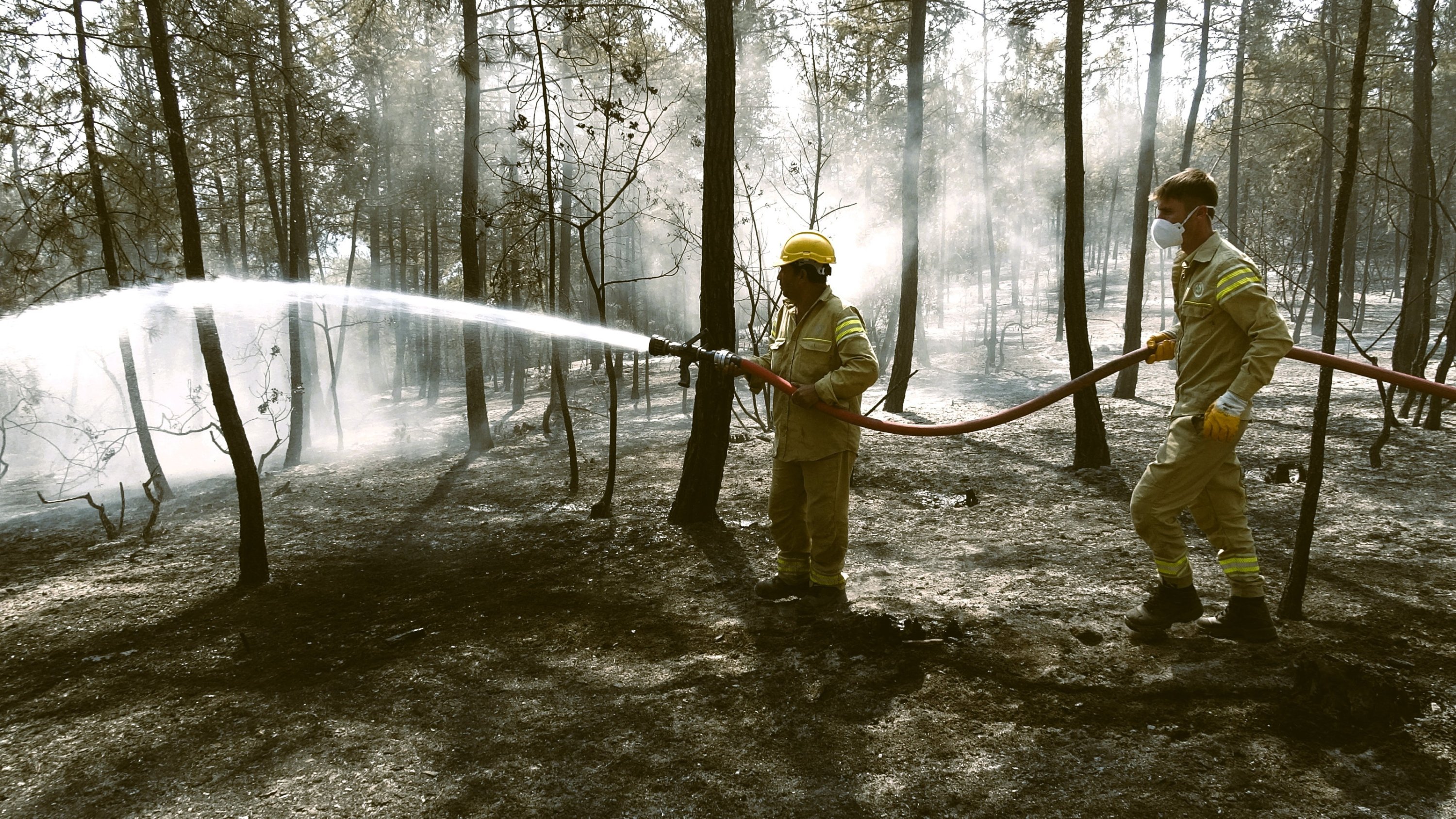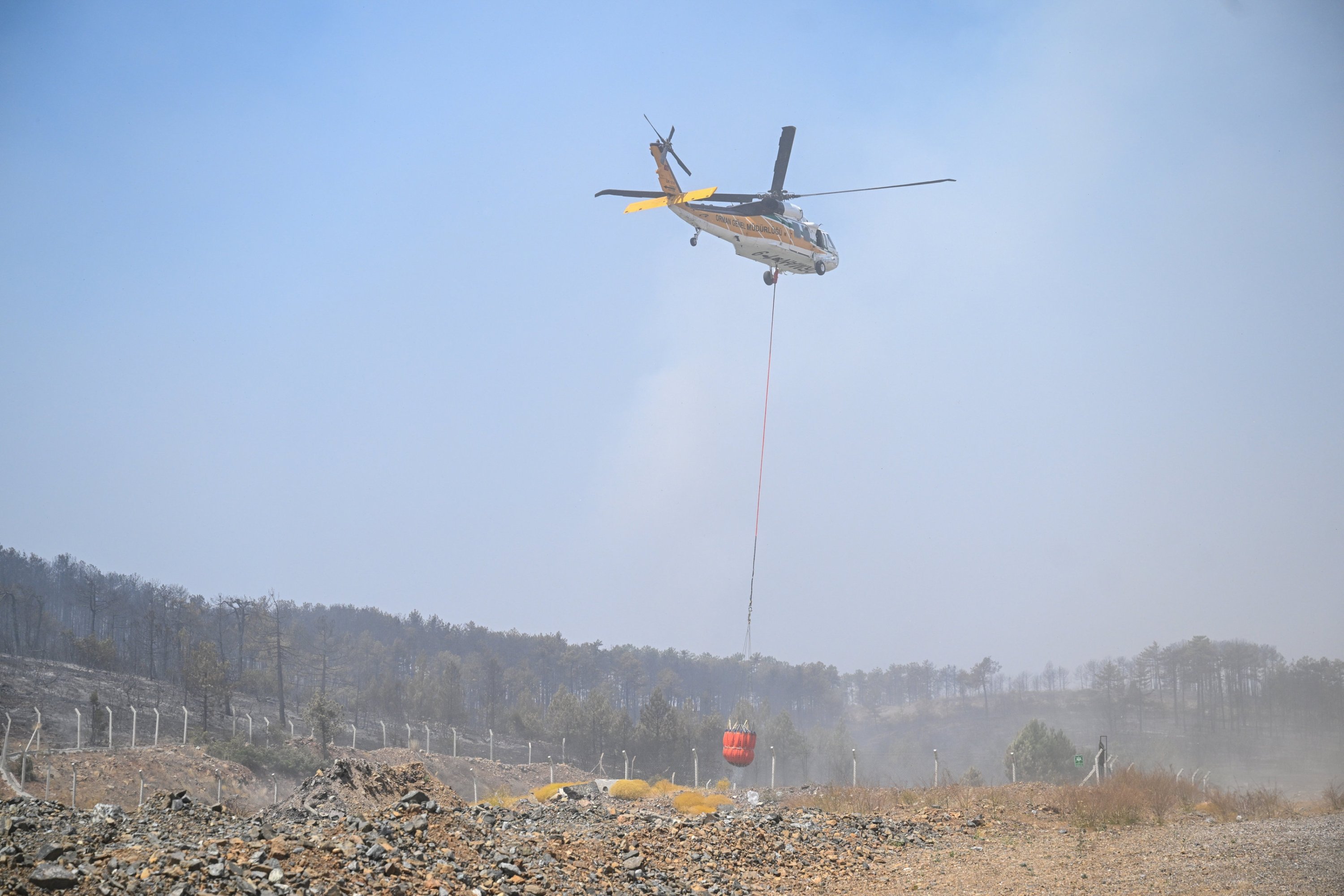Physical Address
Indirizzo: Via Mario Greco 60, Buttigliera Alta, 10090, Torino, Italy
Physical Address
Indirizzo: Via Mario Greco 60, Buttigliera Alta, 10090, Torino, Italy

The forest fire between the Gürsu and Kestel districts of Bursa, northwestern Türkiye, is now in its third day, with efforts still underway to bring it under control.
The blaze, which began two days ago between Gürsu’s Ipekyolu neighborhood, near the Gürsu TOKI Housing Complex and Kestel’s Ağlaşan neighborhood, is being tackled by teams from the Regional Forestry Directorate and local fire brigades.
Local residents are also supporting the firefighting efforts by attaching water tanks to their tractors to help douse the flames. Crews are working intensively to halt the fire’s spread.
In areas where the fire’s intensity has decreased, damage assessment efforts are now underway.
In a statement from the Bursa Governorship, it was noted that Governor Erol Ayyıldız, Agriculture and Forestry Deputy Minister Ahmet Gümen, chairperson of the Parliamentary Committee on Industry, Trade, Energy, Natural Resources, Information and Technology, and Justice and Development Party (AK Party) Bursa MP Mustafa Varank, Provincial Police Chief Sabit Akın Zaimoğlu and Provincial Gendarmerie Commander Idris Tataroğlu are continuing to coordinate the operations at the Bursa Regional Forestry Directorate’s Fire Operations Center.
The statement also reported that a total of 11 aerial vehicles, 971 land vehicles and 2,684 personnel have been deployed to fight two ongoing forest fires in the province, with both ground and air support.
Meanwhile, the investigation into the suspect detained in connection with the ongoing forest fire in Bursa’s Orhaneli and Harmancık districts is continuing.
In a statement from the Bursa Governorship, it was noted that the Chief Public Prosecutor’s Office launched an immediate investigation based on reports related to the forest fires in the province. The statement said, “As part of the investigation, a person who had previously been processed due to links with the Gülenist Terror Group (FETÖ) has been taken into custody.”
Meanwhile, it was discovered that the detainee, U.A., was discharged from the military in 2021 and had previously worked at a fuel station for an unspecified period.
The fire, which broke out on July 26 between the Gürsu and Kestel districts of Bursa, rapidly intensified due to strong winds. As a precaution, residents in the nearby rural neighborhoods of Karahıdır, Iğdir, Ağlaşan and Avdancık were temporarily evacuated.
On Monday, Director of Communications Burhanettin Duran announced on Twitter that three lives were lost: “We are deeply saddened by the loss of our volunteers Ahmet Demirel, Mehmet Şimşek and Kazım Bayrak, who tragically lost their lives when a water tanker overturned during firefighting efforts in Bursa.”

In the Safranbolu district of Karabük, in the Black Sea region of Türkiye, forest fire teams from the General Directorate of Forestry have been tirelessly working for six days to control fires that started six days ago and spread to the Ovacık district and forested areas near the city center, protecting the green homeland.
Despite the difficult terrain, which is mostly steep, rugged, and high, where the fire spread, teams have been working in shifts with only three hours of sleep daily for six days, demonstrating great determination and perseverance. Forest heroes from different provinces of Türkiye are fighting the flames under harsh conditions with their fire trucks, which they have made their temporary homes and are conducting cooling operations in areas where the fire has been brought under control.
The forest teams, working selflessly for six days to protect the country’s natural wealth, often referred to as the lungs of the nation, shared their struggle amid the flames.
Mustafa Şahin from the Adana team, who has been fighting the fire for three days in the Çukurköy Bicikler neighborhood to prevent it from reaching homes, described their profession as difficult and said, “The terrain is tough, but our fight continues. I wish all my colleagues battling the fire ease and success.”
Fevzi Aydoğan from the Çankırı team, calling themselves “the guardians of the green homeland,” sent greetings to his family, loved ones, and all citizens.
Professor Doğanay Tolunay, head of the Department of Forest Engineering at Istanbul University-Cerrahpaşa, highlighted that negligence and carelessness are the leading causes of forest fires, which can be prevented by taking necessary precautions during the summer season.
He cited surprising examples, saying, “Just a few days ago, a forest fire started because a citizen threw a burning pillow out the window while trying to burn a tick.” He also noted fires caused by welding machines in windy conditions, trash burning, cigarette butts thrown from vehicles and the burning of stubble, which remains the most significant cause despite being prohibited.
Tolunay emphasized the scale of the problem, noting that “90% of forest fires are caused by humans” and that the number of annual fires has risen from around 1,500 in the 1990s to 3,800 in 2024, with up to 100 fires breaking out in a single day. He warned about intentional fires set to clear land or out of anger, giving examples such as a fire set by a citizen angry with his father in Marmaris and fires spreading from burned homes to nearby forests.
He stressed the severe environmental consequences of these fires, explaining that ecosystems are destroyed and that “it takes decades for burned areas to be reforested.” Tolunay also highlighted the broader impacts, stating, “Forests are one of the most important factors in combating climate change,” and that fires cause environmental pollution, disrupting the entire food chain from nature to humans.
On the response side, Tolunay shared that the General Directorate of Forestry has significantly increased firefighting resources, with “105 helicopters, 27 airplanes, and 14 drones” fighting fires this year compared to only 35 helicopters and three airplanes in 2021 and 2022. Despite these efforts, he emphasized that “the main focus should be on preventing fires from starting,” cautioning that “after every natural disaster, the efforts and awareness work done tend to be forgotten until the next event.”

Merih Göltaş, lecturer at Istanbul University-Cerrahpaşa’s Department of Forest Engineering, emphasized that the most effective way to combat forest fires is prevention. He highlighted that “about 50% of fires are caused by negligence, 10% by intentional actions, 10% by natural causes like lightning and 30% have unknown perpetrators,” underscoring the importance of public education, awareness, legal measures and deterrents.
Göltaş explained that forest fires result from the combination of topography, climate and human factors under certain conditions. He emphasized the importance of caution during activities like picnics and barbecues, warning against careless behaviors such as throwing cigarette butts from vehicles. Highlighting the impact of climate change, he noted that while an average of 10,000 hectares burned annually until 2021, that year alone experienced “mega fires” burning 140,000 hectares, equivalent to 14 years’ worth of damage.
Addressing the legal framework, Göltaş pointed out that intentional forest fires are the only crime in the Turkish Constitution that cannot be pardoned, with strict penalties also applied for accidental or negligent fire-starting, including imprisonment. He explained that forest engineers sometimes use controlled backfires to contain larger fires, but these actions are occasionally misunderstood by the public, leading to negative reactions toward forestry workers.
Furthermore, Göltaş noted that the General Directorate of Forestry trains volunteer citizens both theoretically and practically to assist during fires. Currently, “131,000 volunteers across Türkiye have been provided with necessary equipment and operate under the Directorate’s guidance,” enhancing firefighting efforts nationwide.
In 2025, wildfires worldwide surged, driven by extreme heat, drought, and the impacts of climate change. From the Mediterranean to the Americas, Asia and Africa, intense and fast-spreading fires caused widespread destruction, with human activity further fueling the crisis.
According to data from the General Directorate of Forestry, between June 1 and June 30, a total of 1,563 fires occurred across the country, including 612 forest fires and 951 agricultural area fires.
Of these fires, 499 started in agricultural areas and spread to forests. Between June 27 and June 30 alone, 147 forest fires and 195 agricultural area fires were recorded.
Between June 27 and June 30, 2025, wildfires erupted in Sakarya’s Taraklı district, quickly spreading into Bilecik’s Gölpazarı. Authorities evacuated 13 villages as flames advanced, though no casualties were reported. Simultaneously, significant fires broke out in Izmir’s Seferihisar and Menderes districts, prompting large-scale air and ground firefighting operations.
By July 23, the fire in Urla, Izmir, and the blaze along the Sakarya-Bilecik border were largely contained, though crews continue cooling efforts amid high-risk weather conditions.
Tragedy struck on July 24, when a fierce wildfire in Seyitgazi, a rural district of Eskişehir in central Türkiye, claimed the lives of 10 emergency responders, five forest workers and five members of the Search and Rescue Association (AKUT).
The team was working deep within the forest to halt the fire’s spread toward Afyonkarahisar when a sudden shift in wind direction trapped them. Fourteen others sustained injuries but survived. The fire, intensified by extreme heat, strong winds, and critically low humidity, became one of the deadliest of the season.